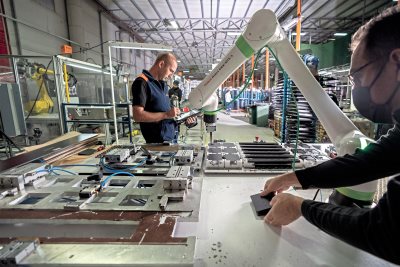Fanuc: Developing Robots With Empathy
FANUC supports SUPSI to optimise teamwork between human and machine
Robot manufacturer FANUC is supporting the development of an empathetic robot for use in industrial tasks. The EU‐funded research project “Fluently”, led by Roboverse Reply, aims to create a robot platform that enables true social collaboration between humans and machines.
The objective of the three-year project is to develop an advanced AI‐based wearable device for operators and robots, as well as a dedicated training centre called ‘The Fluently RoboGym’, where factory workers and robots will train smooth interaction in industrial processes.
A total of 22 partners from science and industry are involved in the project, which is supported by Horizon Europe, the EU’s most important funding programme for research and innovation. The Automation, Robots and Machine Laboratory within the Swiss University of Applied Sciences ﴾SUPSI﴿ is responsible for the technical coordination. In addition to researchers from SUPSI, the project involves scientists from several internationally leading institutions like the Politecnico di Torino in Italy and Waseda University in Japan.
“Workers are often exposed to high cognitive or physical loads,” explains Professor Anna Valente, head of SUPSI’s Laboratory of Automation, Robotics and Machines and a member of the Swiss Science Council. “When a human works closely with a robot, it is important that the robot recognises the human’s feelings and responds accordingly, by adjusting its dynamics, for example.”
Good teamwork between humans and machines is especially important in modern smart factories, where production volumes and products are constantly changing, and where mobile transport systems and robots co‐exist with static workstations.
“Our industrial robots are already equipped with sensors for seeing and feeling, but as yet they cannot recognise human emotions,” says Ralf Völlinger, General Manager of the Robot Division at FANUC Europe. “We want to enable even more people to use our industrial robots easily and efficiently.”
‘Fluently’ researchers are concentrating their development work on three value chains that are instrumental for the European economy: the dismantling and recycling of batteries for e‐bikes and electric vehicles; inspection and assembly processes in the aerospace industry; and the refurbishment of highly complex industrial parts via laser processing.
“These processes are currently almost completely manual, causing workers to experience mental and physical stress,” states Professor Anna Valente. “The origins of this stress come from dismantling batteries that carry the risk of explosion or handling heavy parts in aerospace industry, for example.”
Robots could in future relieve workers at least partially from the stress involved in these processes and take over some of the more time‐consuming tasks. This outcome would help to preserve the competencies and experience of workers while simultaneously leading to potential upskilling activities.
“We want to train robots to become teammates of humans and support them as best as possible,” says Professor Anna Valente. Ralf Völlinger from FANUC Europe adds: “As robot supplier we are proud to support this pioneering development with our robots and technical know‐how.”
This content was first published on the Fanuc website.

